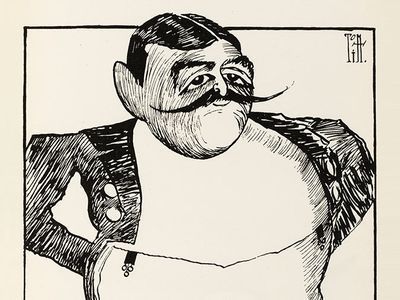Should Buchan's villain receive an apology at the Proms?
Sir Edgar Speyer by Tom Titt (1913) Photograph: (c) Mary Evans Picture Library 2010
By MICHAEL CAINES
By which question I mean: consider the "troublesome case of Sir Edgar Speyer".
Born in New York and educated in Germany, Speyer was a financier who became a British citizen in 1892; he went on to become a baronet, a privy councillor and, among other things, the saviour of the Proms, "placing them on a sound financial footing when they were threatened with bankruptcy", as Mark Bostridge puts it in this review of a new book about Speyer by Anthony Lentin, from the current issue of the TLS.
Speyer was also, however, a notable victim of the anti-German prejudice that had been building up for many years before the outbreak of the First World War, with the rumours about his links to Germany, as well as public displays of hostility against him and his wife, eventually driving him to emigrate, to the United States, in 1915. It's an extraordinary piece of pyrrhic scapegoating, even if Speyer was, as his latest biographer suggests, guilty of putting business before loyalty to his adopted country.
The same year, 1915, saw the publication of John Buchan's great "shocker" The Thirty-Nine Steps, in which the archvillain is apparently based on Speyer (see the end of Leanne Langley's fine account of this "saviour in London cultural history"). Readers of the time might well have seen a resemblance.
After many hair-breadth 'scapes, Buchan's hero Richard Hannay tracks down his enemies, a trio of German spies, to their lair: a villa on the Kentish coast called Trafalgar Lodge. (Speyer's house on the Norfolk coast became a particular focus of speculation.) Outside is an enormous Union Jack. Only by a lucky stroke does Hannay see through these and other intimations of respectability and fervid patriotism to see the leader of the gang for what he is: "sheer brain, icy, cool, calculating, as ruthless as a steam hammer. . . . His jaw was like chilled steel, and his eyes had the inhuman luminosity of a bird's". Continuing the bird analogy to the end, Hannay sees a "white fanatic heat" in those eyes; "Appleton" is a patriot, after all. Just the wrong sort of patriot.
The book was a bestseller, and not by accident. As Christopher Harvie noted in his Oxford edition (1993), Buchan had read The Riddle of the Sands by Esrkine Childers, in which another nefarious German plot is foiled, and in 1914 checked "what its sales had been". Like Childers's yarn, The Thirty-Nine Steps played perfectly on the mood of the times. The TLS reviewer, Harold Hannyngton Child, probably wasn't alone in admiring Buchan's ability to make the wartime reader feel as if "he himself was the hero": "we are heartily grateful to Mr. Buchan for giving the world so vivid and truthful a narrative of our adventures, escapes, and achievements".
That climactic confrontation with Appleton and his cronies is a good example of Buchan's art as Child describes it, as the outcome hangs on "our" (ie, Hannay's) vivid impressions of his opponents and the tipping of the scales one way and then the other. I wonder, though, if the credibility of the story would have also depended on the widespread knowledge of the British Establishment being infiltrated at the highest levels – as in the recent case of Sir Edgar Speyer, "spy".
Buchan's brilliance as a storyteller clashes with the likely truth of the matter, that Speyer "was probably neither anti-British nor anti-German", just driven by his business concerns. An unlikely fanatic, then – and, in other respects, an entirely admirable supporter of the arts, not least the Proms and the Whitechapel Art Gallery. It doesn't always happen that author and reviewer find themselves in perfect agreement, so savour this moment while you can: Mark Bostridge echoes Anthony Lentin in arguing that this centenary year presents a good time for "some belated recognition" of Speyer's philanthropy, "not least his efforts in saving the Proms from extinction". How about "a gesture of homage at some point during this year's last night"?
Peter Stothard's Blog
- Peter Stothard's profile
- 30 followers




